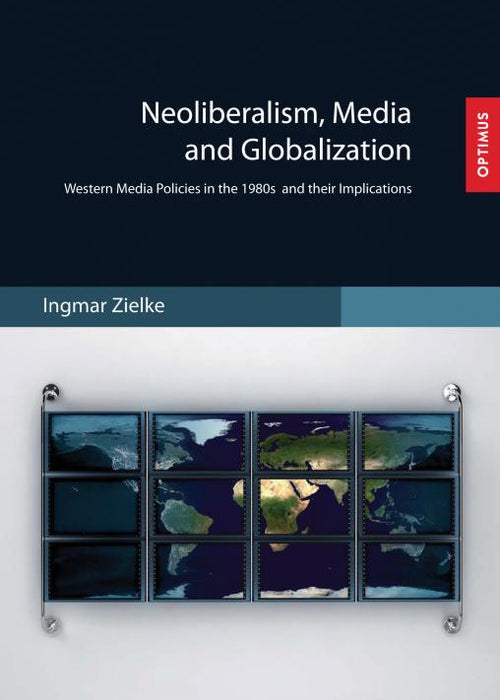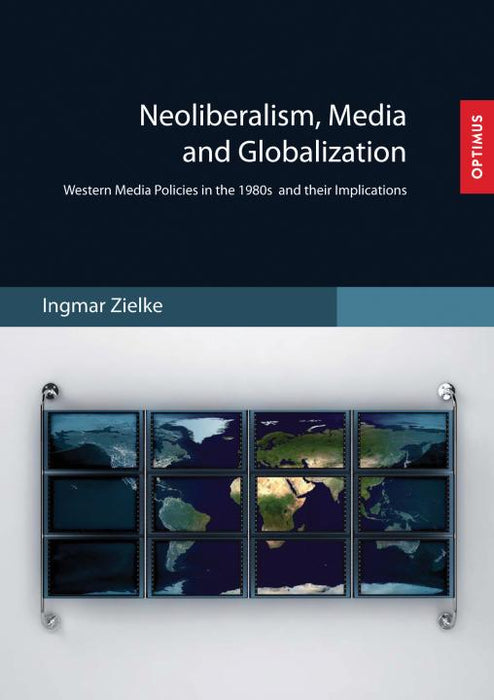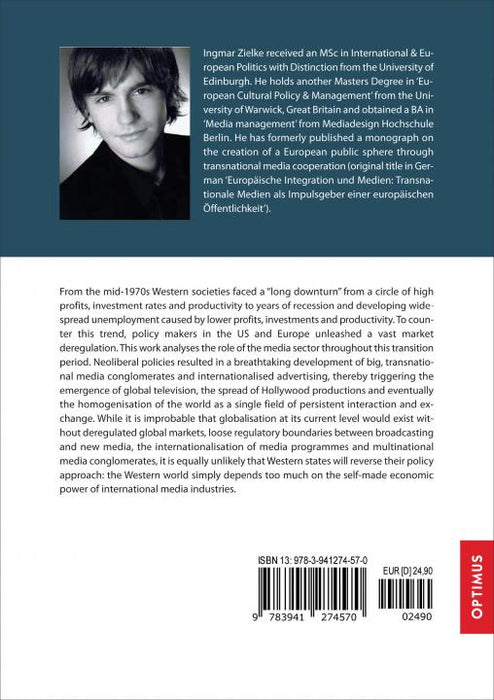Neoliberalism, Media and Globalization. Western Media Policies in the 1980s and their Implications
- Urheber: Zielke, Ingmar
- Verfügbarkeit: Auf Lager
- EAN: 9783941274570
€24,90
From the mid-1970s Western societies faced a "long downturn" from a circle of high profits, investment rates and productivity to years of recession and developing widespread unemployment caused by lower profits, investments and productivity. To counter this trend, policy makers in the US and Europe unleashed a vast market deregulation....
From the mid-1970s Western societies faced a "long downturn" from a circle of high profits, investment rates and productivity to years of recession and developing widespread unemployment caused by lower profits, investments and productivity. To counter this trend, policy makers in the US and Europe unleashed a vast market deregulation. This work analyses the role of the media sector throughout this transition period. Neoliberal policies resulted in a breathtaking development of big, transnational media conglomerates and internationalised advertising, thereby triggering the emergence of global television, the spread of Hollywood productions and eventually the homogenisation of the world as a single field of persistent interaction and exchange. While it is improbable that globalisation at its current level would exist without deregulated global markets, loose regulatory boundaries between broadcasting and new media, the internationalisation of media programmes and multinational media conglomerates, it is equally unlikely that Western states will reverse their policy approach: the Western world simply depends too much on the self-made economic power of international media industries.
Details
- Titel: Neoliberalism, Media and Globalization
- Untertitel: Western Media Policies in the 1980s and their Implications
- Autor: Ingmar Zielke
- Auflage: 1. Auflage
- Hochschule: University of Edinburgh (GB)
- Note: First / A
- Erschienen: 1. Aufl. 17.12.2010
- Fachbereich: Medienwissenschaft
- Produkttyp: Buch (Gebunden)
- Produktart: Masterarbeit
- Sprache: Englisch
- Einband: Softcover (Paperback)
- Maße: 21,0 x 14,8 cm (DIN A5)
- Umfang: 52 Seiten
- Zustand: Neu (eingeschweißt in Folie)
- Keywords: Adam Smith, Adorno, Theodor W., ARD, Bertelsmann, CDU, deregulation, Deregulierung, economic crisis, Globalisierung, Globalization, global television, Helmuth Kohl, Keynes, liberalisation, Massenmedien, Media, media market, Media policies, Medienpolitik, Milton Friedman, Neoliberalism, Neoliberalismus, private broadcasting, privatisation, public service broadcasting, Ronald Reagan, SPD, ZDF
Inhaltsverzeichnis
1 Introduction
1.1 Field of exploration
1.2 Structure
2 Neoliberalism, Media and Globalisation
2.1 The Comeback of Adam Smith: Neoliberalism
2.2 Media, Media Policy and the Mass
2.3 Economical and Cultural Globalisation
3 Developments in the USA and Western Europe
3.1 The Long Downturn and the Comeback of Liberalism
3.2 Impacts on Cultural Industries
3.3 Media Policies in the US and in Europe in the 1970s and 1980s
3.4 The Emergence of International Media Conglomerates
4 Germany’s Media Policies in the 1980s
4.1 Developments in the Western German Broadcasting
4.2 From Public Service Broadcasting to the Dual System: Monopolism or Free Flow of Information?
4.3 The Staatsvertrag of 1987
4.4 Consequences for the German Media Sector
5 Conclusion and Perspective
6 Bibliography
Autor
Ingmar Zielke received an MSc in International & European Politics with Distinction from the University of Edinburgh. He holds another Masters Degree in 'European Cultural Policy & Management' from the University of Warwick, Great Britain and obtained a BA in 'Media management' from Mediadesign Hochschule Berlin. He has formerly published a monograph on the creation of a European public sphere through transnational media cooperation (original title in German 'Europäische Integration und Medien: Transnationale Medien als Impulsgeber einer europäischen Öffentlichkeit').
Downloads
DRM: Digitales Wasserzeichen
Dieses eBook enthält ein digitales Wasserzeichen und ist damit für Sie personalisiert. Bei einer missbräuchlichen Weitergabe des eBooks an Dritte ist eine Rückverfolgung an die Quelle möglich.
Dateiformat: PDF (Portable Document Format)
Mit einem festen Seitenlayout eignet sich die PDF besonders für Fachbücher mit Spalten, Tabellen und Abbildungen. Eine PDF kann auf fast allen Geräten angezeigt werden, ist aber für kleine Displays (Smartphone, eReader) nur eingeschränkt geeignet.
Systemvoraussetzungen:
PC/Mac: Mit einem PC oder Mac können Sie dieses eBook lesen. Sie benötigen dafür einen PDF-Viewer - z.B. den Adobe Reader.
eReader: Dieses eBook kann mit (fast) allen eBook-Readern gelesen werden. Mit dem amazon-Kindle ist es aber nicht kompatibel.
Smartphone/Tablet: Egal ob Apple oder Android, dieses eBook können Sie lesen. Sie benötigen dafür einen PDF-Viewer - z.B. den Adobe Reader.
Buying eBooks from abroad
For tax law reasons we can sell eBooks just within Germany and Switzerland. Regrettably we cannot fulfill eBook-orders from other countries.



